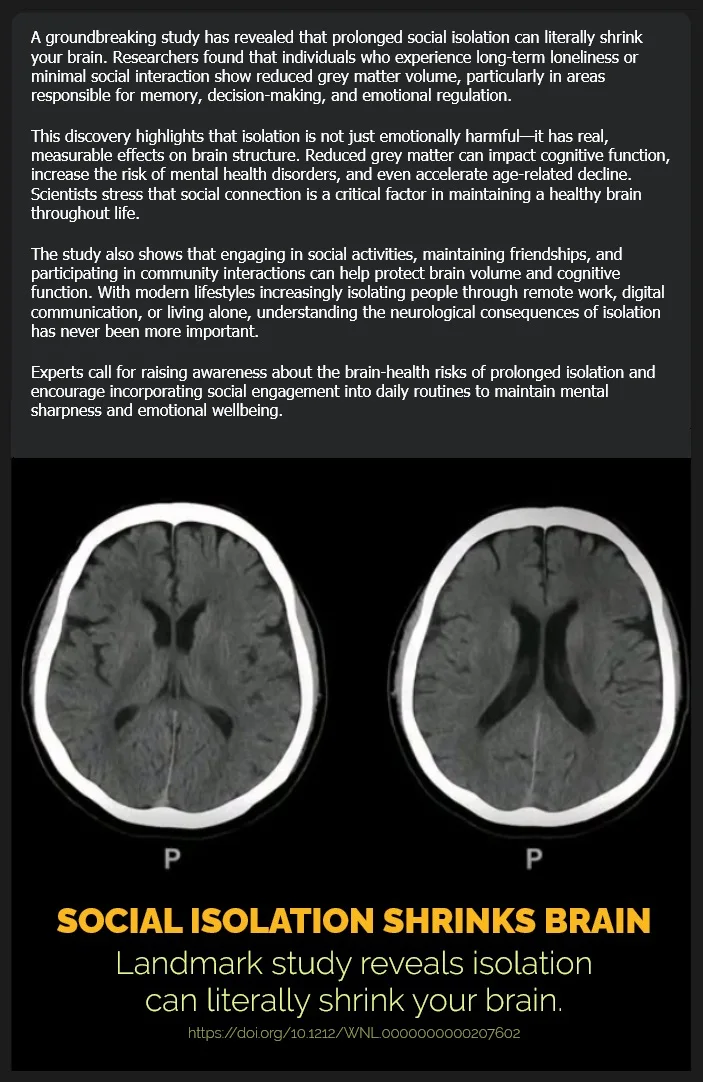Today's Sunday • 6 mins read
Many unhappy things happen when you live on your own for a long time.
This removal from social life can make you forget how to act around others, talk to them, respond to their words, or read their feelings and thoughts in their minds.
Prolonged social isolation causes loneliness, as opposed to the rejuvenating effect of solitude.
It strips away the usual anchors of daily life, especially when isolation extends from weeks into months or years. Your experience of yourself and the world has some fundamental shifts.
The changes aren’t always visible from the outside. They happen internally, in the architecture of thought and feeling. Some adaptations protect you. Others create distance that becomes hard to cross later.
What Happens When You Live Alone For A Long Time
1. Your Mind Becomes Its Own Echo Chamber
Without regular social input, thoughts circle back on themselves. Conversations that ended days or weeks ago replay with new interpretations.
You revisit what someone said, decode hidden meanings that may not exist, and grow suspicious of motives you once took at face value.
The mind fills the empty space with overanalysis because it has no new data to process. Past interactions become the primary material for mental activity.
You overthink negative events from every angle until they lose their original shape.
This isn’t just about feeling sad; it rewires your brain in abnormal ways:
- Increases defensiveness: John Cacioppo’s brain-imaging research found lonely brains focus heavily on self-preservation when social threats appear. You become less capable of empathizing with others.
- Triggers depressive symptoms: Paradoxically, this makes you less likely to engage in social disputes, creating further isolation.
- Elevates morning cortisol: This stress hormone prepares your brain for “another dangerous day,” keeping you in constant fight-or-flight mode.
2. Your Emotional Life Flattens
Living alone, cut off from regular human contact for long, can flatten your emotions.
Your feelings lose their edges. Joy, anger, and excitement all seem to dial down when there’s no one to share them with or react to them.
Isolation can also stifle and drain your psychological resources. It gets harder for you to be brave, strong, and curious.

Social contact creates emotional contrast.
When you used to socialize, a friend’s laughter amplified your humor. Their anger sparked defensive heat. Their worry deepened your concern.
Without these exchanges, your emotional range settles into a narrower band. You still feel, but the peaks and valleys smooth out into something more uniform, less intense.
Life becomes emotionally muted and passive.
3. Social Noise Becomes Jarring
After months of silence, the ordinary chaos of social interaction can feel assaultive.
Small talk grates. Interruptions seem aggressive. Random emotional expressions from others, like a sudden laugh, an irritated sigh, land with unexpected force.
You’ve adapted to the predictability of solitude, where you control the sensory and emotional environment.
The unpredictability of group settings, once manageable, now overwhelms your recalibrated nervous system.
4. Time Loses Its Shape
Days blur when there are no external markers.
Appointments, spontaneous visits, and phone calls create temporal boundaries in normal lives. Without them, Tuesday feels like Saturday. Morning melts into afternoon without a clear transition.
The mind drifts into a kind of timelessness.
For some, this brings peace. For others, it creates an eerie sensation of floating, unmoored from the shared rhythms that anchor most people’s lives.
5. You Grow Comfortable in the Quiet
Loneliness hurts at first. The absence of connection creates genuine pain, a kind of psychological hunger that gnaws.
But humans adapt to almost anything, including isolation. Over time, you find comfort in quiet routines. The predictability becomes soothing.
Social demands fall away, and with them, the anxiety they often carried. This comfort can be a genuine restoration.
It can also harden into avoidance, where the thought of reconnecting triggers more anxiety than the isolation itself.
6. Your Identity Becomes Self-Referential
People function as mirrors. They reflect back who we are through their reactions, their questions, and their challenges to our perspectives.
In isolation, that mirror disappears. Your sense of self becomes entirely self-referential. Most of your references are shaped by internal narratives rather than external feedback.
You are whoever you tell yourself you are, with no one to confirm or question that story. This can create freedom or delusion, depending on how honestly you examine yourself.
7. Empathy Takes One of Two Paths
Some people in long-term isolation become detached. They struggle to connect with others’ emotions because they’ve spent so long disconnected from their own social circuitry.
The muscle weakens from disuse. Others move in the opposite direction, developing deeper compassion. They know what disconnection feels like from the inside.
They recognize the specific ache of being unseen, unheard. Their empathy deepens through a firsthand understanding of what many people experience but rarely discuss.
8. Structure Becomes Essential
Social life provides a natural rhythm. Coffee dates, work meetings, and family dinners are some crucial external events that create structure.
Without them, you need to build your own. Self-imposed schedules and rituals become psychological anchors. Morning coffee at the same time. Walks at noon. Dinner at six.
These routines provide stability when there’s nothing external to organize your day. They prevent the complete dissolution of boundaries that can happen when every day is equally shapeless.
9. Self-Awareness Sharpens Through Silence
Silence forces confrontation with thoughts usually drowned out by social noise.
You hear your own mental patterns more clearly. The recurring worries, the self-judgments, the fantasies, and the fears you normally distract yourself from can lead to genuine insight.
You get the kind of self-knowledge that requires sustained attention. It can also create discomfort when you discover aspects of your thinking you’d rather not face.
10. Your Brain Shrinks, And Dementia Starts
Did you know that isolation can shrink your brain?
This study on 8,896 people found social isolation is linked to a reduction in brain volume, particularly in areas associated with memory and dementia. It gets harder for you to remember things and do things that need brainpower.

Final Words
Somewhat sad is the fact that returning to social life doesn’t quickly reset you to your pre-isolation state.
The small talk, once easy, now feels hollow. Being in a group drains your energy fast.
You no longer trust the people you meet. You do not ask for help from others, as you have adapted yourself to strict self-reliance.
Start with patience. Tell yourself that people can be trusted to talk to, can be asked for little things, and can be spent time with doing apparently meaningless things.
• • •
√ Also Read: How Chronic Stress Reshapes Your Brain (How To Protect It)
√ Please share this if you found it helpful.
» You deserve happiness! Choosing therapy could be your best decision.
...
• Disclosure: Buying via our links earns us a small commission.
